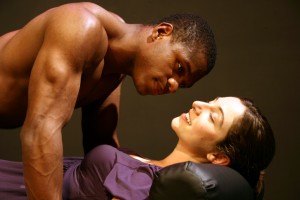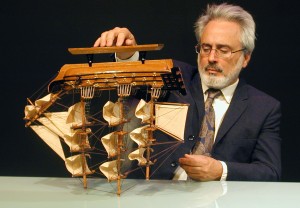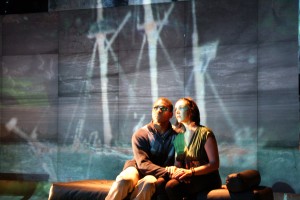Here’s a nice one minute promotional video of the Cutting Ball Tempest, now extended through Dec 19. Too bad I’m not going to California for Christmas this year!
An interview with Rob Melrose of Cutting Ball
An interesting conversation here with Rob Melrose, director of The Tempest and founder of Cutting Ball theater.
San Francisco Chronicle
A less generous review of Cutting Ball’s Tempest.
Early Review of Cutting Ball Tempest
The Breakdown of the Multiple Parts in the Cutting Ball Tempest
I mentioned in my last entry that three actors play all the roles in our version of The Tempest. The breakdown of the parts are as follows:
David Sinaiko – Prospero, Alonso, Stephano
Donell Hill – Ferdinand, Caliban, Antonio
Caitlyn Louchard – Miranda, Ariel, Gonzalo, Sebastian, Trinculo
The first scene with the Boatswain we have staged as a kind of collage of voices, and Adrian and Francisco’s lines have been redistributed amongst the other lords.
 Our director, Rob Melrose, is working with the concept that there are three meta-roles – Prospero, Ferdinand, and Miranda – and that the other doubled characters may be understood as fragments of their personalities and psyches or how they are perceived by another character. Other three-actor productions, such as the London Globe’s 2005 Tempest, have used a similar conceits to ground their actors (in their case, Prospero, Caliban, and Ariel instead of Prospero, Miranda, and Ferdinand). Critics like Marjorie Garber have noted that the, with the abundance of similarities between the sets of characters, that the story may be reduced to a story involving certain key figures or types.
Our director, Rob Melrose, is working with the concept that there are three meta-roles – Prospero, Ferdinand, and Miranda – and that the other doubled characters may be understood as fragments of their personalities and psyches or how they are perceived by another character. Other three-actor productions, such as the London Globe’s 2005 Tempest, have used a similar conceits to ground their actors (in their case, Prospero, Caliban, and Ariel instead of Prospero, Miranda, and Ferdinand). Critics like Marjorie Garber have noted that the, with the abundance of similarities between the sets of characters, that the story may be reduced to a story involving certain key figures or types.
With this understanding, the actors change characters not simply when there is a need manifested by the plot (i.e. it’s now time for the Stephano scene, so the actor playing Prospero has to turn into Stephano), but when there is a need created within the meta-character (Prospero is turning into Stephano because something in the last scene has triggered the Stephano aspect of his conscience).
To give an example: we begin the first scene between the shipwrecked lords with Alonso drinking from a bottle out of despair from the loss of his son. By the time this scene comes to a close, Alonso has drunk so much that the Stephano aspect is able to appear. Stephano and Alonso share many of the same defining traits as Prospero – they are, each in their own way, leaders and masters, but with varying levels of sophistication and mastery. In the case of Ariel and Miranda, the first instance of the change is manifested when, after Prospero lulls Miranda to sleep, he awakens the latent Ariel personality within her almost by means of a kind hypnosis. In some instances, we need to get a little creative with the narrative. Sebastian and Gonzalo cannot be onstage at the same time, so the Sebastian aspect only awakes when Gonzalo is asleep.
It may appear from my account that we are taking quite a bit of liberty with the text. True enough, our production is not as strict as a more “traditional” interpretation (whatever that means), but I feel that a lot of the logic we have created for the transition between characters is more for the benefit of the actors than the audience. When they are able to make sense of why they change characters, the audience can make sense of the transitions as well. Once again, we are not trying to force a new narrative down the audience’s throats that warps The Tempest, we are telling the story of the play.
The actors have all taken great pains to significantly differentiate the characters through their voice and physicality and those choices, with the aid of certain costume choices (glasses for Ferdinand, sunglasses for Antonio, etc.), but, with the same three actors playing all the roles, it is impossible to dupe the audience into believing that the characters are entirely distinct. Shakespeare was undoubtedly conscious of these similarities when he wrote the play, and if those similarities are expressed so clearly with three actors, we would be doing ourselves a disservice by trying to mask it.
-Bennett Fisher, Dramaturg
Cutting Ball Theatre’s production of William Shakespeare’s The Tempest opens November 5 at the Exit on Taylor in San Francisco. More info at www.cuttingball.com
Cutting Ball Theatre’s Three Actor Tempest in Rehearsal
 In my dramaturgical research for The Tempest, I was delighted when I stumbled upon blog entries written by actors during the rehearsal process for Globe Theatre in London’s three-actor production of the play in 2005. I found those entries profoundly informative, since the actors not only discussed their interpretation of the characters and their understanding of the play’s meaning, but addressed the challenges of manifesting those ideas physically in the production. So, when Professor Mentz offered to have us blog about our production at the Cutting Ball Theatre in San Francisco, which begins previews on November 5, I was delighted. I hope that these entries provide an interesting and worthwhile supplement to the course.
In my dramaturgical research for The Tempest, I was delighted when I stumbled upon blog entries written by actors during the rehearsal process for Globe Theatre in London’s three-actor production of the play in 2005. I found those entries profoundly informative, since the actors not only discussed their interpretation of the characters and their understanding of the play’s meaning, but addressed the challenges of manifesting those ideas physically in the production. So, when Professor Mentz offered to have us blog about our production at the Cutting Ball Theatre in San Francisco, which begins previews on November 5, I was delighted. I hope that these entries provide an interesting and worthwhile supplement to the course.
Our director, Rob Melrose, has chosen to stage the play with three actors – David Sinaiko, Caitlyn Louchard, and Donell Hill – playing all the roles, hoping that it will give “an up close and personal look at the monsters lurking inside all of us.” Our staging includes video projection, original music, and other surreal elements that I hope to describe in more detail in future entries. Most dramaturgs are justifiably wary of more experimental stagings, but I believe theater is a living organism, and just in the way modern critics have been able to read everything from Freud to Fanon into The Tempest, so should we freely though heedfully dive certain fathoms into a piece to find what may be buried at the center. Combing through some critical writings on The Tempest and seeing the actors on their feet in rehearsal, I feel that this production succeeds in uncovering compelling and essential aspects of Shakespeare’s play that may not be as readily apparent in a “traditional” staging. Overlapping groups of threes abound in the play – the Prospero, Miranda, and Ferdinand trio, the Prospero, Ariel, and Caliban trio, the Caliban, Stephano, and Trinculo trio, and so forth. Seeing the same actor in a different role a few pages creates wonderful, unexpected moments of revelation. Prospero’s line to Miranda that “to the most of men this [Ferdinand] is a Caliban/And they to him are angels” is deliciously curious when the actor playing Ferdinand has just minutes before left the stage as Caliban: the audience is left to question whether or not there is any fundamental difference between the two. Just so, when Stephano (played by the same actor playing Prospero) shows affection for Caliban, we are reminded of that missing episode before the events of the play when Prospero was loving and compassionate to his sole subject on the island. Moments later when Caliban entreats “Prithee, be my god”, we are viscerally made aware that this new allegiance, like Caliban’s allegiance to Prospero, is not much better. Oddly, by reducing the number of actors, we have revealed more about the similarities and differences between each character than one might be able to do with a larger cast.
Innumerable critics have talked about the relationship between The Tempest and psychology – likening the island to the human mind, arguing Ariel and Caliban are Prospero’s Superego and Id respectively and that the play is the story of reconciling these aspects of his conscience. Melrose is interested in exploring the play in this light, but also sees it as a deeply personal story about a father letting go of his daughter, a man forgiving his enemies, and the universal desire shared by all men and women to be “released.” I think this focus on the human element has helped keep our production grounded in the story, and, ultimately, is what preserves, what is, in my opinion Shakespeare’s most essential messages in the play, that “the rarer action/Is in virtue than in vengeance.” Freud and Jung are there, and plentifully, but the audience is not held hostage by the concept but given freedom to draw their own meaning. Our Island may be more surreal at moments, but we’ve built a bridge to the mainland.
-Bennett Fisher, Dramaturg
